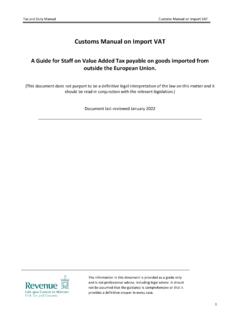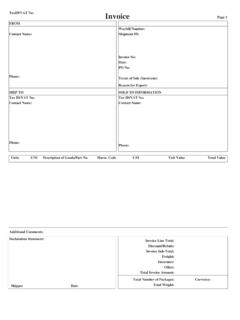Transcription of Guide to the VAT One Stop Shop
1 1 EUROPEAN COMMISSION DIRECTORATE-GENERAL TAXATION AND CUSTOMS UNION Indirect Taxation and Tax administration VAT Brussels, March 2021 Guide to the VAT One Stop Shop (applicable from 1 July 2021) Table of Contents General information on this Guide .. 2 Abbreviations .. 2 Background .. 4 Part 1a - Registration .. 10 Background: .. 10 Specific details .. 14 Part 1b - Deregistration/exclusion .. 22 Background .. 22 Specific details .. 22 Deregistration ..22 Exclusion ..27 Date on which deregistration/exclusion becomes effective ..28 Quarantine period ..31 Part 2 - One Stop Shop VAT returns .. 33 Background .. 33 Specific details .. 33 Part 3 - Payments .. 44 Background .. 44 Specific details .. 44 Part 4 - Miscellaneous .. 47 Records .. 47 Invoicing.
2 47 Bad debt relief .. 48 Annex 1 - The legislation .. 49 Annex 2 - The registration details .. 50 Annex 3 - The One Stop Shop return 55 2 General information on this Guide This Guide aims at providing a better understanding of the EU legislation (see Annex 1) relating to the extended One Stop Shop, as well as the functional and technical specifications for the special schemes, as adopted by the Standing Committee on Administrative Cooperation (SCAC). This Guide is not legally binding and is only practical and informal guidance about how EU law and EU specifications are to be applied on the basis of views of DG TAXUD. The Guide is a work in progress: it is neither exhaustive nor a final product but reflects the state of play at a certain point in time in accordance with the knowledge and experience available.
3 Over time, it is expected that additional elements may be needed. The enlarged One Stop Shop is part of the VAT e-commerce package. Extensive explanations and clarifications on the VAT e-commerce rules can be found in the "Explanatory notes on the new VAT e-commerce rules": Abbreviations B2C Business to consumer EU European Union IOSS Import One Stop Shop IOSS VAT identification number VAT identification number allocated to a taxable person or to the intermediary in respect of a taxable person for which he is appointed to use the import One Stop Shop MOSS Mini One Stop Shop MS Member State MSI Member State of identification MSC Member State of consumption OSS One Stop Shop OSS schemes One Stop Shop schemes: non-Union scheme, Union scheme, import scheme SME/SMEs Small enterprise/Small enterprises Supplier taxable person supplying goods and/or services 3 Taxable person not established in the EU a taxable person who has not established his business nor has a fixed establishment in the EU or who has established his business in a territory of a Member State to which the VAT Directive does not apply (see Article 6 of the VAT Directive 2006/112/EC).
4 TBE services telecommunications, broadcasting and electronically supplied services 4 Background The mini One Stop Shop (MOSS), which was put in place on 1 January 2015, has been extended to become a One Stop Shop (OSS) as from 1 July 2021 covering a wider range of supplies and has introduced further simplifications. This enlarged One Stop Shop covers three special schemes: the non-Union scheme, the Union scheme and the import scheme. The scope of the already existing non-Union scheme and Union scheme has been extended, whereas the import scheme has been newly introduced. These special schemes allow taxable persons to declare and pay VAT due in Member States in which these taxable persons are (in general) not established via a web-portal in the Member State in which they are identified (Member State of identification).
5 The schemes are optional. In practice, a taxable person who is registered for an OSS scheme in a Member State (the Member State of identification) will electronically submit OSS VAT returns detailing the supplies that can be declared in the respective OSS scheme along with the VAT due. The VAT return is submitted quarterly in the non-Union and in the Union scheme and monthly in the import scheme. If a taxable person chooses to use one of the schemes, he has to declare all supplies that fall under that particular scheme via the OSS return of the respective scheme. These OSS VAT returns, along with the VAT paid, are then transmitted by the Member State of identification to the corresponding Member States of consumption via a secure communications network.
6 The OSS VAT returns are additional and do not replace the VAT return a taxable person submits to his Member State under his domestic VAT obligations. The OSS schemes are available to taxable persons established in the EU and outside the EU. Taxable persons who are established in the EU can use the Union scheme and the import scheme, whereas taxable persons who are not established in the EU can possibly use all three schemes, the non-Union, the Union and the import scheme. Without the OSS schemes, the supplier would be required to register in each Member State in which he supplies goods or services to his customers. The OSS schemes are optional for taxable persons. However, when choosing to use an OSS scheme, the taxable person must apply the scheme to all supplies falling under this scheme in all relevant Member States.
7 The taxable person cannot, therefore, opt to use the OSS scheme just for supplies in some Member States and not for supplies in other Member States. Once opting into the scheme, it is applicable for all supplies to consumers in all Member States. The legislation relating to the One Stop Shop is contained in a number of legislative acts (see Annex 1). In order to provide taxable persons and Member States with a clear understanding of the operation of the One Stop Shop, the Commission has brought the salient points together in the form of a Guide to the One Stop Shop. This Guide to the One Stop Shop covers four elements: The registration process, including deregistration/exclusion; The return process (including corrections); The payment process, including reimbursements; Miscellaneous, including record keeping.
8 5 For the purposes of these elements, it is important to clarify some basic concepts: 1) The concept of a taxable person in relation to the One Stop Shop Under the non-Union scheme, a taxable person is a business (be it a company, a partnership or a sole proprietor) which has not established its business (place of business) in the EU, nor has a fixed establishment there. Being identified or required to be identified for VAT purposes in the EU does not prevent the taxable person from using the non-Union scheme. Under the Union scheme, a taxable person is a business (be it a company, a partnership or a sole proprietor) which has established its business in the EU or has a fixed establishment there. Note: A taxable person not established in the EU can also use the Union scheme to declare certain supplies of goods (see part 2 One Stop Shop VAT returns).
9 Under the import scheme, a taxable person is a business (be it a company, a partnership or a sole proprietor) established within the EU or outside the EU. However, a taxable person established outside the EU1 is required to appoint an intermediary to use the import scheme. 2) The concept of deemed supplier A deemed supplier is a taxable person who is not the actual supplier of certain goods, but he facilitates the supply and is therefore, for VAT purposes (only), treated as the supplier (fiction for VAT purposes). A deemed supplier is a taxable person who facilitates a supply of goods that is concluded between a supplier (underlying supplier) and a customer through the use of an electronic interface ( marketplace, platform, portal etc.
10 In the Union scheme a deemed supplier is a taxable person established in the EU or outside the EU who facilitates a supply of goods: via an electronic interface that takes place in the EU ( intra-Community distance sales of goods as well as domestic supplies of goods) to a non-taxable person if the underlying supplier is established outside the EU. In the import scheme a deemed supplier is a taxable person established in the EU or outside the EU who facilitates a supply of goods: imported from a third territory or a third country in a consignment of a value not exceeding EUR 150 to a non-taxable person 1 A taxable person established in a third country with which the Union has concluded an agreement on mutual assistance, does not need to appoint an intermediary to be able to use the import scheme ( Norway) for supplies of goods that are dispatched from that country.








